A bird singing and chirping can be heard at all times of the day. Most of us associate the chirping of a songbird with the early hours of the morning however, there are many birds that actually chirp during the night too. This is due to a variety of factors associated with the bird and the environment it is in.
A bird’s body clock is heavily reliant on light; therefore its daily rhythm is very much governed by the sun. When the sun is just about to rise in the morning, songbirds begin to sing as the first rays awaken their internal body clock.
Dawn typically stages the songs of the robin, followed by sparrows and later, finches. As the sun rises, these birds sing until it is light enough for them to begin foraging.
Similarly, as the sun sets in the evening, the birds would return to song, albeit this time starting with the finches first and the robins last. But although light plays a key factor in governing the singing patterns of such birds, some birds are known to chirp at night-time, too.
Let’s take a look at the effects of light, or more importantly, the absence of light, in more detail…
The Presence and Absence of Light on Chirping Birds
Some birds, like the Robin, are aware and active in the presence of very low light – which is why they are the first to sing at dawn, and the last to sing at dusk. They continue to chirp after the final sunrays of the evening as it turns into night. Robins are able to feed under artificial light and can in fact be triggered into song by other means of artificial light including streetlight or floodlight (more on Robins later).
As birds’ body clocks are controlled by changes to light throughout the day, their body clocks can actually be affected by artificial light in urban areas (such as streetlights and buildings) that are lit for 24 hours – thus making them carry on singing into the night.
This is mainly why nocturnal birds are extremely common in urban areas like cities. A flood of artificial light pollution can tamper with the bird’s natural body clock, making them out of sync with their response to light and causing them to chirp outside of daylight hours.
For this reason, we can believe that many birds who sing at night (particularly in cities), sing because they are quite simply just confused by the presence of light pollution. They will therefore remain active in the night think that it is dusk and continue to sing as normal.
Do changes in noise affect birds chirping?
Light pollution is indeed one of the main factors that cause birds to chirp at night in urban areas, but there are several other reasons that might explain why you hear birds sing in dark, unlit areas in the winter.
It may be possible that the noise of traffic and people in towns, cities and residential areas actually drown out the sound of a bird’s song – which is why they result to singing in the night-time.
Birds are intelligent creatures when it comes to adapting their song to the noise conditions of their habitat – for instance, birds in cities are known to sing louder, faster and in higher pitches in order to be heard above the noises of the city.
Blackbirds are known to change their song in the presence of ambient noise in order to be heard, and great tits are renowned for changing their pitch in towns and cities in comparison with the countryside.
It is not unusual, therefore, for birds to favour singing at night whilst the noises of towns and cities are at a minimum.
It may be common for birds to sing if they are woken during the night by thunder or other loud noises.
Fireworks are also responsible for awakening birds – which may contribute to them singing. Birds react very strongly to potential danger and wake easily during the night which may cause them to sing in alarm.
Similarly, some birds may be awakened by the song of other (nocturnal) birds and will proceed in joining them in as it if was a dawn chorus.
Which Birds Sing at Night?
Whilst some birds may sing at night by accident or because they are simply confused, there are in fact a number of birds that are most active in the night – and these are likely to be the ones you hear chirping.
Whether they are nocturnal birds who prefer to only come out at night, or birds that are active for most of the day but prefer the stillness of the night-time; there are a number of reasons you might year a bird chirp after dark. So, let’s take a look at some of the birds you might be hearing at night…
Robins
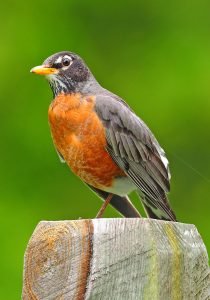
Robins are very active birds and, despite being most active during the day, continue to sing (and forage) in the night. As mentioned earlier, Robins are particularly well adapted to low and dim lighting.
They can continue to forage in low light conditions or artificial lighting (such as street lamps), as well as be tricked into continuing with their singing in the night as they think that it is daytime.
Robins are the first birds to sing at dawn, as well as the last to stop at night. These birds are the most common night-time songbirds and are very likely to be responsible for the chirping you hear at night, particularly in urban and residential areas.
Robins are distantly related to the Nightingale – another nocturnal songbird – and are likely to join them in song during the night. As Robins are also very territorial birds, they, like other birds, sing in order to defend their territory (as well as attract a mate).
In Winter season they are one of the few birds to withhold a territory and are likely to sing when other birds stop.
Owls
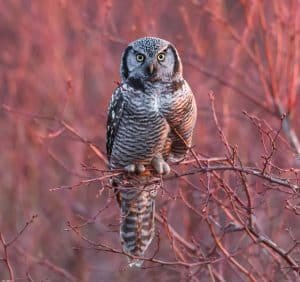
Owls are notorious for being active during night-time throughout much of the year. Whilst these birds tend to hoot more than chirp, they are still active and recognisable singers in the night.
There are several breeds of Owls across North America which are likely to be heard at night.
Barn owls have a screeching sound, as opposed to a hoot, that can be heard at night. Barred owls also have loud songs that can be heard at night which is most often when two owls call on each other.
Mockingbirds
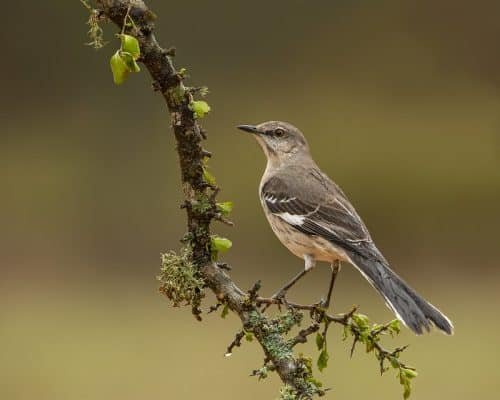
It is very common to hear a Northern Mockingbird chirp at night in North America. Although Mockingbirds are traditionally active during the daytime, typically, juvenile and unmatched male Mockingbirds will sing through the night (often to attract females).
They are frequent visitors of backyards and are residents of most regions of the U.S. as well as further North into Canada and South towards Central America. Their songs are most often heard in residential areas in towns and cities.
Mockingbirds are also known to impersonate other birds and can memorise up to 200 different songs. These birds tend to prefer the night-time to communicate with other birds (as well as attract females) because there is less vocal competition.
Although these birds are active singers in the U.S. day and night, their numbers are unfortunately depleting. Their immense singing capabilities means the rate of mockingbirds caged is increasing, and the number of mockingbirds in the wild seem to decrease yearly.
Robins are distantly related to the Nightingale – another nocturnal songbird – and are likely to join them in song during the night. As Robins are also very territorial birds, they, like other birds, sing in order to defend their territory (as well as attract a mate).
In Winter season they are one of the few birds to withhold a territory and are likely to sing when other birds stop.
Eastern Whip-poor-will
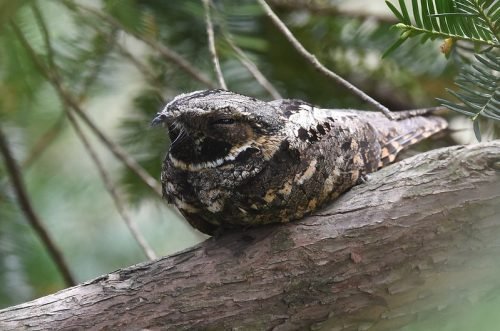
Eastern Whip-poor-wills have a distinguishable loud song that can be heard at night. They range primarily in the Southern U.S. near warmer climates, particularly during winter season.
Whilst these birds are not songbirds by definition, their long, abrasive songs are enchanting and very well-known.
In fact, these birds can sing for several minutes at a time. Their songs are sung year-round, albeit most often heard in spring and summer when these birds are most active in eastern U.S.
These birds are most often heard, rather than seen as their colouring is dark and camouflaged against the night.
They are nocturnal birds, meaning they sleep during the day and are active at night – which is why their songs are only heard during this time whilst they communicate with one another.
For these birds, the lack of noise at night makes it easier for them to communicate and there is less competition for them, which makes it a more favourable time to be active. Similar to Mockingbirds, however, the population of these birds is rapidly declining.
Black Rail
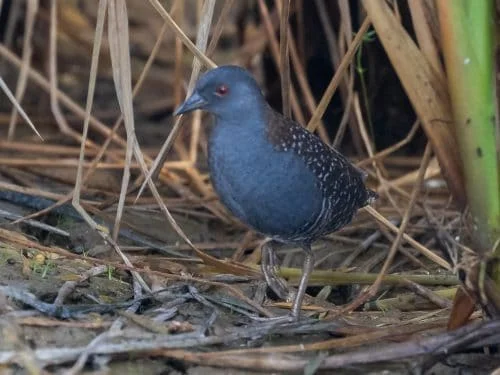
Black Rails are very territorial birds found most commonly in Texas, Florida and California.
They can be heard often singing in the night, most likely marking their territory to warn other birds.
Their songs can sound harsh and forceful, which makes them rather distinctive and easy to identify. These birds choose not to go out or be seen until it is dark, and some will not sing at all during the daytime. Most Black Rails are secretive and hide amongst dense marshes. Their calls can sometimes sound like low, deep growls.
